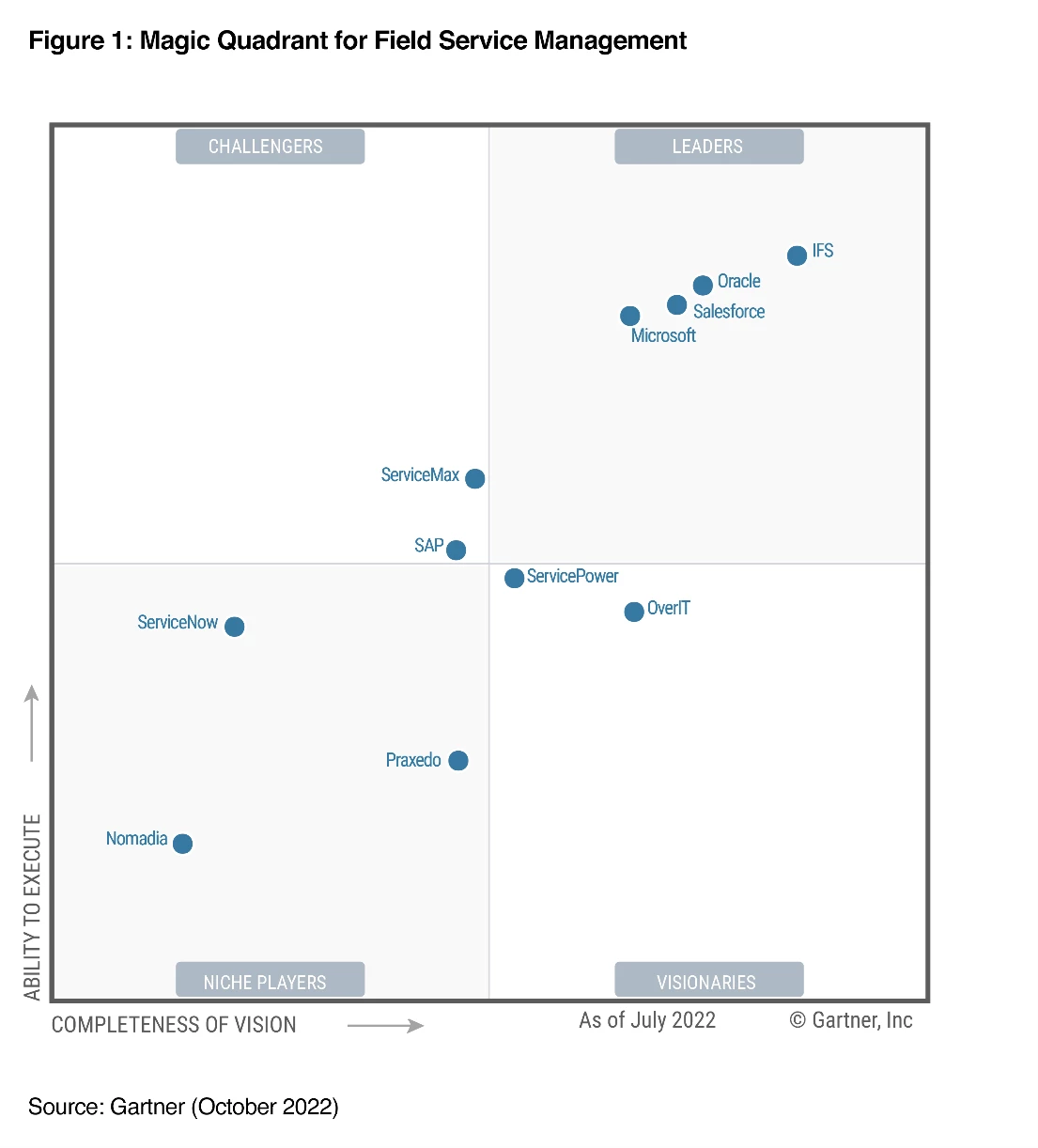1 min read
What is IFS ERP Software? Everything Need to Know About IFS Cloud
Is IFS Cloud ERP the Game-Changer Your Business Needs? When was the last time your ERP system felt like a growth enabler rather than just a...
The right (or wrong) solution has the power to make or break an organization.
When it comes to enterprise resource planning (ERP) and enterprise asset management (EAM), two enterprise app vendors come to mind as top performers in their field: IFS and Oracle. Both IFS and Oracle offer robust ERP and EAM solutions that serve the modern enterprise throughout its lifecycle.
However, in 2026, they serve very different masters. Oracle is the finance-first giant; IFS is the operations-first specialist.
Let's take a look at the capabilities of each and discover which solution is most ideal for your business.
When it comes to ERP software, IFS tends to think outside the box.
After spending years identifying what manufacturing customers really want and need from an ERP system, they've retooled their flagship ERP to deliver users with a best-in-class cloud-based ERP solution that’s more useful, in-depth, and more integral to key business processes than other leading ERP applications.
In fact, IFS Chief Product Officer, Christian Pedersen, went on the record stating:
"One of the things that we saw from working with customers was that increasingly they were bringing [business applications] together. What became clear was that the traditional solution categories like ERP, and Enterprise Asset Management and CRM, were not what customers ever wanted: it's something that we, as an industry, invented and brought to market. The reality is what customers are looking for are end-to-end business processes."
To offer a more comprehensive ERP that organizations can fully incorporate into their business processes, IFS launched IFS Cloud in the spring of 2021, which included an entire suite of tools built around 15,000+ native APIs allowing users to work beyond the traditional, established application classes of ERP, finance, Human Resources, payroll, supply chain, and customer relationship management (CRM).
IFS makes this happen by building these tools atop a single data model, to have the power to offer products that serve organizations throughout their business processes, rather than just checkboxes for individual software industry product categories.
IFS Cloud ERP solves a major ERP problem: Large, monolithic enterprise solutions that are costly to implement and run, and often fail since they can’t truly get the entire enterprise into one solution.
Thanks to API integration, plus the option of creating a user interface combining application data from multiple sources, IFS allows users to bring together tools from many different vendors, in essence building their own IFS ERP, one that does more than just enterprise resource planning.
The Details
While many ERP vendors try to be all things to all types of businesses, IFS has decided to double down on where they excel, which is providing an integrated set of ERP, EAM, and FSM solutions to manufacturers within the mid-market enterprise (MME), all on a single platform. In fact, they do it better than all the leading ERP vendors, including Oracle, SAP, and Microsoft.
IFS’s mid-market manufacturing focus makes sense for a lot of organizations where solutions like Oracle NetSuite or SAP BusinessOne are not quite as capable but don't require an eight-figure budget and 24-month implementation like Oracle Cloud or SAP S/4 HANA either.
.png?width=626&height=424&name=Infographics%20Landscape%20(2).png) IFS’s strengths lie in a few particular areas, making it the ideal ERP solution for companies in these industries.
IFS’s strengths lie in a few particular areas, making it the ideal ERP solution for companies in these industries.
For starters, IFS is flexible. The solution offers programming that makes it easy for users to create custom layers and other personalizations without impacting its core system to tailor IFS to an organization’s individual needs.
It doesn’t require advanced, outside programmers to make changes, and can typically be adapted and customized in-house.
Additionally, IFS enables enterprises to provide an exceptional customer experience, in particular where businesses have field operations, providing robust features and capabilities for team members working in the field.
Some ERP systems are too heavily focused on the back-office side of ERP, with a focus on things like financials and inventory management.
While these are essential, they aren’t as unique or impactful as the customer experience.
To further validate the legitimacy of IFS's commitment to the customer experience, Gartner recently named IFS as the leader in the Field Service Management category, displacing many well-known brands such as Oracle, Microsoft, ServiceMax, and Salesforce.

Like IFS, Oracle’s ERP Cloud is a popular ERP tool commonly used in the public and private sectors. It’s comprehensive, cloud-based, and can be simple to use and scale, but its use in certain industries is not as robust or intuitive as IFS.
Oracle describes its ERP solution:
“ Oracle ERP Cloud delivers connected teams, unified data, and real-time insights to help you and your finance team ensure that the best business decisions are made. With ERP delivered as a service in the cloud, your organization can be future-ready and outpace change.”
It’s an ERP that’s been designed with streamlining business processes in mind, with an integrated financial management system and available modules for things like procurement, project portfolio management, risk management, and compliance, which is perhaps why it’s one of the most commonly used ERP solutions on the market today.
Oracle is a strong fit for global and multinational companies (it even supports a whole host of languages), but that doesn’t mean it’s always well-suited for mid-market organizations.
Over the last decade, Oracle has acquired many other companies with ERP-related tools and implemented many of the features and functionalities of these into its core ERP solution, which enables companies to easily integrate Oracle with other best-of-breed departmental applications (e.g., HCMS, Marketing Automation, FP&A, etc.).
Compared to IFS, Oracle's three primary areas of strength fall within the following categories:
CPQ - Configure Price Quote
Oracle offers a robust configure, price, and quote (CPQ) capability. This is useful for manufacturing companies that engineer or make-to-order products, empowering sales team members to easily configure and customize quotes on the fly for their clients, which accelerates the order-to-cash process while delighting customers in return.
HCMS - Human Capital Management Systems
Oracle has very strong capabilities within its Talent Management and Human Capital Management offerings, and the products integrate seamlessly with the core Oracle ERP functionality. For businesses considering Workday or SuccessFactors in addition to an ERP solution, Oracle can be a great alternative.
Performance Management, Business Intelligence & Reporting
With the acquisition of Hyperion several years ago, Oracle was able to bring those capabilities into its Cloud ERP product. For businesses looking for best-in-class reporting, dashboard, and performance management capabilities, Oracle is a very strong contender.
The bottom line: While Oracle has some impressive capabilities, it doesn’t offer the breadth of manufacturing and field service capabilities as strongly as IFS does. Even though Oracle acquired JD Edwards several years ago its more complex manufacturing capabilities are not fully baked into Oracle's cloud offering. For businesses with complex manufacturing needs Oracle Cloud ERP is not ready for prime time and this is especially true for manufacturers that have global and/or complex supply chains.
Maintenance management software or enterprise asset management (EAM) can be vast and confusing. IFS seeks to simplify these processes. IFS EAM has been engineered to serve as a comprehensive EAM model that supports organizations throughout the entire lifecycle and each stage of use, applying vital evaluations that aid in both predictive and preventative maintenance.
IFS’s EAM is designed to make project management effortless, sharing all kinds of available metrics to track asset integrity, performance, and maintenance status, components, and heavy equipment. The computerized maintenance management system (CMMS) also features a mobile platform for field use so that any user with access can check reports or make evaluations regardless of location.
Oracle’s EAM was put together to support the needs of many industries with an asset lifecycle overview and self-service portals that speed up the process of sharing maintenance information and other updates.
With Oracle, users can get fixed plans, mobile infrastructure, and linear evaluations of their processes. They also get support for financial planning via real-time analytics and preventative maintenance schedules to deliver better results and reduce equipment breakdowns.
Work Orders
When users need to open, process, and complete work orders like
customer service tickets or maintenance tasks, they need an efficient-1.png?width=445&height=270&name=Astra%20Canyon%20Web%20assets%20(4)-1.png)
process that reduces scheduling issues and other errors.
IFS edges out over Oracle thanks to its ability to limit asset
downtime and avoid scheduling errors. With IFS, users can create work orders then assign them to the right team, all via a mobile app and calendar tool.
Thanks to these features, organizations can plan project management tasks, maintenance work, and other services, set preventative schedules based on equipment needs, inspections, and more, and even implement a scheduling optimization and planning module.
Oracle automates work order creation and resource allocation and allows users to route work orders to the right teams to streamline the workflow, then track the work performed for quality assurance. It can also remind users of upcoming work orders and repeated maintenance tasks so nothing gets missed or overlooked.
Asset Management
Asset lifecycle management sits at the very center of EAM software, and both IFS and Oracle do well by their customers to help maintain assets.
IFS’s maintenance system includes many asset management features for:
IFS also has a centralized database that allows organizations to track asset information including costs, warranties, work orders, documents, and more, then takes things a step further by integrating with backend processes and service level agreement tracking to maintain compliance.
Oracle’s EAM provides full transparency into asset activities like transactions, usage, maintenance history, warranties, and more. Organizations have the power to assign parts lists to individual assets then track their locations, allow users to check out assets, then check them back in when they are finished to track employee usage. It also combines maintenance tasks with finances into one operation, ensuring compliance and worker safety.
Maintenance Management
Again, IFS surpasses Oracle in abilities here because the solution offers preventative maintenance to help organizations maintain their assets and keep them in prime condition. It comes equipped with detailed planning tools that help users plan and manage the disruption of business processes for maintenance, and also shares in-depth analytics for enterprise-wide maintenance. Thanks to calendar-based scheduling, users can rest easy knowing that all maintenance is up-to-date and executed by the right teams at the right time. Plus, the system stores maintenance logs for easy access.
Oracle relies on integration, not the base CMMS, which complicates things. It does enable standardized maintenance and preventative maintenance procedures, as well as a scheduler workbench tool to schedule work orders and maintenance.
Materials Management
Organizations need to be able to track the assets flowing in and out of their facilities. Materials management includes things like audit trails, hazardous materials tracking, material allocations, item classification, parts management, and more. Once more, IFS is just a step ahead of Oracle with embedded materials management features that automate the entire process without having to switch between systems. IFS strikes the right balance for materials management with the full incorporation of procurement and purchasing management features, plus all the basic materials management features that other providers like Oracle offer.
Reporting and Business Intelligence
Organizations need to choose a solution that allows users to collect data on their assets then use this information to gather essential insights on how these assets perform, then make future predictions based on real data.
Yet again, IFS sneaks ahead thanks to built-in integrations. Oracle’s CMMS has robust reporting, data intelligence, and self-service business intelligence, but IFS has built-in analytics tools and a customizable dashboard to help make sense of it all, and create KPI reports for individual assets and the entire enterprise, then integrate with Microsoft Suite and Microsoft BI for even more advanced reporting and analytics.
The right ERP solution for your business will come down to your unique business requirements, your people, budget, and timeline.
For businesses with complex manufacturing needs, Oracle Cloud ERP is often "not ready for prime time," especially for manufacturers that have global and/or complex supply chains. IFS Cloud offers a unified, industry-specific solution that is ready to handle the operational reality of 2026.
Still unsure? At Astra Canyon Group, we help companies navigate this decision every day.

1 min read
Is IFS Cloud ERP the Game-Changer Your Business Needs? When was the last time your ERP system felt like a growth enabler rather than just a...

7 min read
Your next Enterprise Resource Planning (ERP) system will either unlock your factory or cement your bottlenecks. You've likely outgrown your...

Still running IFS Applications 10 and weighing whether the jump to cloud ERP is worth it? You’re not the only one. For many IT leaders, it’s a race...